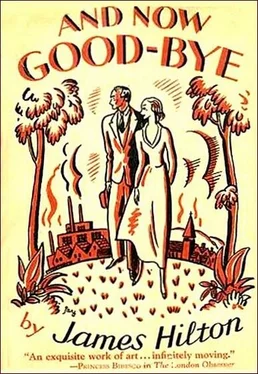Towards seven o’clock a mysterious imminence made itself felt in the atmosphere; there was a good deal of scurrying about on the part of the seven girls, and at a certain moment one of them, who had apparently been looking out of an upstairs window, called out: “Father’s coming!” A few moments later a rather elderly man, grey-haired but very upright, walked briskly between the two rows of hollyhocks and entered the house. He kissed his wife and each one of his daughters very loudly, and then, on being made aware of Howat’s presence, said gruffly: “How do you do, my boy?” and shook hands with him. After that he led the way to the dining-room and said a slow and solemn grace. There was little talking during the meal; sometimes he made a remark to which someone gave answer, but there was none of the chatter that had made the tea-table so noisy, and even Mrs. Coverdale did not seem in such an easy-going mood.
Afterwards she mentioned that Ho wat had confessed to being ‘musical,’ and sure enough, Mr. Coverdale suggested that he should ‘play a tune’ on the harmonium. For this purpose he was conducted into a very primly furnished drawing-room, full of stuffed birds and china ornaments; he was terribly nervous with all the family crowding round him, and more especially because he had never played a harmonium before. At first he failed to realise that he had to work the pedals, and even when he had made this important discovery he found that some of the notes wouldn’t sound, and that a rather rapid Chopin study hardly suited the peculiarities of the instrument. He made what he felt to be a complete hash of the whole thing, but to his surprise and relief everyone appeared delighted, and Mr. Coverdale even went so far as to thank him in a deep booming voice.
A fortnight later it was somehow or other settled that Howat’s holiday should not come to an end in the normal way, but that he should take up a permanent position in the Coverdale household.
Mr. Coverdale, indeed, thought the boy might ‘do pretty well’, and this, from such a source, was high enough praise. He had been a little prejudiced against him at first for having been brought up ’Church of England’, but he soon found that the boy was intelligent, well-mannered, and ready to work hard. Mr. Cover-dale owned a saw- mill and timber-yard adjoining Kimbourne station, and it was not difficult to find ways in which the boy, by working eight or nine hours a day, could thoroughly earn the weekly half-crown which, in addition to his keep, became his initial wage.
Mr. Coverdale was a strict employer, but he was a strict man altogether; he neither drank nor smoked; he would literally have shrunk from touching a pack of cards; and his dislike of strong language went so far as to bring even such phrases as ‘good heavens’ under the ban. Every Sunday, without fail, he preached long and lugubriously eloquent sermons in little dissenting chapels scattered over the surrounding districts; some of these engagements involved journeys of ten or a dozen miles, and he would always make these on foot and in all weathers, disdaining even to saddle a horse, much less to make use of the unhallowed Sunday train service. Fortunately, he was a man of strong constitution and excellent physique; it was his boast, made with due thankfulness, that he had never had a day’s illness in his life.
Howat did not dislike him even from the beginning, and soon came to be quite comfortable at Kimbourne. After a week or so he knew all the girls by sight and by name, though he was still rather nervous of them; the eldest, Lavinia, was hardly a girl at all; she was twenty-four, which seemed to him an immense age. It was Lavinia who kept the others in order, but Howat, if his shyness permitted him to have any active preferences at all, liked the younger ones better; the youngest of all was Mary, aged fifteen. He felt rather more drawn to Mary because she was only a ‘kid’, and was a good deal bullied by the elder girls.
Life would really have been very pleasant, but for Sunday, which came as a day of gloom after the comparatively cheerful activities of the working week. On Sunday no newspapers or ordinary books were allowed to be read, though if Mr. Coverdale’s preaching engagements were at a distance it was sometimes possible to persuade Mrs. Coverdale to unlock the bookcase after he had gone. When, however, as very often happened he was occupied locally, the day progressed from morn to evening according to a most rigid routine. The whole family trooped out twice to the bleak little chapel at the Dover end of the village and filled up the pew immediately under the pulpit. Howat usually sat at one end and Mrs. Coverdale at the other, with the seven girls in between. He did not exactly enjoy the services, which seemed to him cold and uninteresting compared with the ones he had been used to, but there were times when Mr. Coverdale’s rough eloquence stirred him to a vague self-scrutiny; and in any case, he always liked the singing, for he was beginning to develop a good voice and enjoyed using it. Then one Sunday the organist failed to appear, and Howat was asked, in an emergency, to play the hymns. He did so, fairly well, and when, some months later, the organist died, the boy was officially appointed in his place.
It was only an old and very wheezy American harmonium, but in it Howat found something to make Sunday a day to look forward to; he enjoyed particularly the opening and closing voluntaries, which gave him a chance of showing what he could do. Usually he played one or other of the simple pieces that had been left behind by the previous organist, but one morning, in a mood of great daring, he ignored the music sheet before him and made up something of his own as he went along. Rather to his astonishment no one complained or even appeared to notice any departure from the normal; and thus emboldened, he made a fairly regular habit of such improvisations. He did not, though, tell anyone about it.
After be had been at Kimbourne a year Mr. Coverdale increased his wage to ten shillings a week, and declared himself ’quite satisfied with him.
Those were the years when Howat was growing up, and when every month, almost every day, marked new and noticeable development. He was a rather quiet boy, good-looking in a thoughtful way, and he had very fine and striking eyes. He was not, however, particularly observant or knowledgeable, or he would have been aware that at least three of the Coverdale girls were head over ears in love with him. Lavinia, the eldest, considered she had a prior right to any attachment he might eventually make, and there were frequent quarrels between her and her sisters on this account. Howat, in fact, treated them all with complete impartiality, except that Mary, as still something of a kid, was admitted to more casual intimacies.
Howat’s chief thoughts at this time were all on one subject—music. Since his very earliest days he had been entranced by tunes, and now, with advancing youth, the desire to explore the magic world of harmony became speedily a passion. After the discovery that he could improvise, he seriously set himself to study the technique of composition; and most evenings, if he had time to spare, he would go to the harmonium in the drawing- room and try over invented tunes of his own. The family believed him to be ‘practising’, but at last the secret had to come out. He had submitted a song in a competition run by a musical journal, and had received the second prize of a guinea. The cheque arrived one morning at breakfast-time, and his delight was quite impossible to hide. When they all learned the truth, they were rather mystified; it seemed odd to them that Howat should have been able to pick up actual money in such a peculiar way.
One effect the disclosure had was to remove any further need for secrecy; henceforth all Howat’s musical work was carried on openly. Some of the girls had mediocre voices, and Howat sometimes composed songs for them; but this was never much of a success, and the girls only bothered about it because they enjoyed the intimacy with Howat which trying over the songs involved. Even Lavinia, who had no voice at all, tried to develop one so as not to be at a disadvantage in this respect.
Читать дальше











